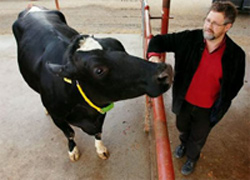



Cloning animals is more feasible than ever, but consumer acceptance is not a given
US - When the farming industry embraced artificial insemination during the 1940s, some critics argued that it would lead to animal abnormalities or destroy breeding businesses. Others proclaimed it tantamount to playing God. Professor of Animal Species James Murray pats a cloned Holstein cow at the Animal Science Dairy Barn on Thursday, February 1, 2007 at the University of California Davis in Davis, Calif. Research animals, Dot and Ditto are three-year old Holstein cows that have been cloned. Professor of Animal Species James Murray pats a cloned Holstein cow at the Animal Science Dairy Barn on Thursday, February 1, 2007 at the University of California Davis in Davis, Calif. Research animals, Dot and Ditto are three-year old Holstein cows that have been cloned. |
Such objections have long since faded away, at least beyond the fringes, and the technology now is used to produce about three-quarters of all dairy cattle. To supporters of the U.S. Food and Drug Administration's preliminary approval of food from most clones and their offspring, a December announcement that sparked wide and vehement protests, the history of artificial insemination (AI) is telling.
"The information age changes the way that people can fan the flames of controversy," said James Murray, professor of animal science at the University of California, Davis, who argues that extensive scientific research has shown no danger from cloned animals. "This is just AI with the Internet. It's a storm in a teapot."
Opponents of the FDA's decision, however, point to a more recent precedent: the agency's approval of St. Louis-based Monsanto Co.'s synthetic bovine growth hormone (BGH) in the early 1990s.
Consumer groups immediately called for boycotts, and many dairy processors pledged to reject the drug. In the 14 years since BGH's approval, its use has never exceeded about one-third of U.S. cattle. Recently announced plans to curtail or eliminate BGH by Dean Foods, Wal-Mart, Kroger, Safeway, Starbucks and other major retailers and manufacturers promise to squeeze that market share further.
"When Monsanto tried to get the entire dairy industry to embrace growth hormones, we understood that people who bought our milk weren't going to want it. The same lesson applies here," said Marcus Benedetti, president of dairy processor Clover Stornetta Farms in Petaluma, which has said it will not use cloned animals.
On Dec. 28, the FDA said in a draft risk assessment that meat and milk from adult clones of cattle, swine and goats and their offspring are as safe to consume as that from standard animals. Therefore, it concluded, labeling shouldn't be required. (The agency said there is insufficient information on sheep clones to make a determination on food consumption risks.)
The FDA is seeking public comment on the subject until April and is expected to issue a final determination soon after. An agency spokesman did not respond to repeated inquiries for comment on this story.
The strongest evidence that the products of clones and their progeny will face difficulty gaining acceptance are surveys that consistently show a majority of consumers hold a negative impression of such food.
"There's no doubt that consumers' aversion to or dislike of cloned products ... will translate to the marketplace," said Joseph Mendelson, legal director for the Washington, D.C.-based Center for Food Safety. "For a variety of reasons, they will reject it."
Source: insideBayArea.com








